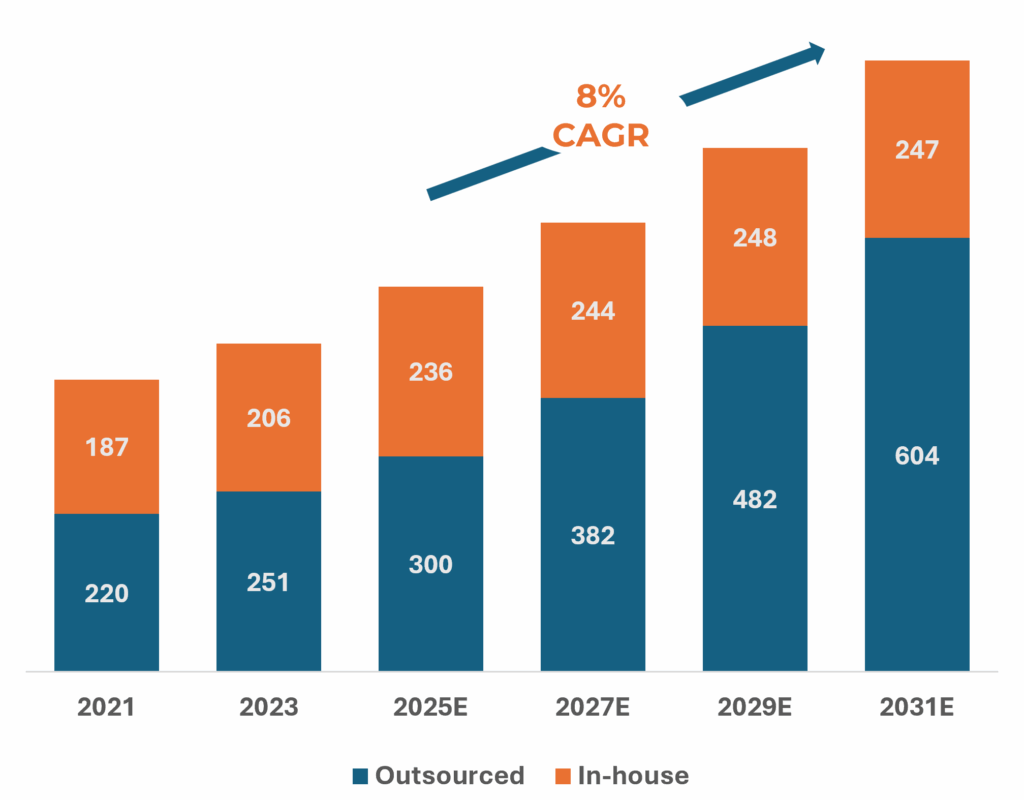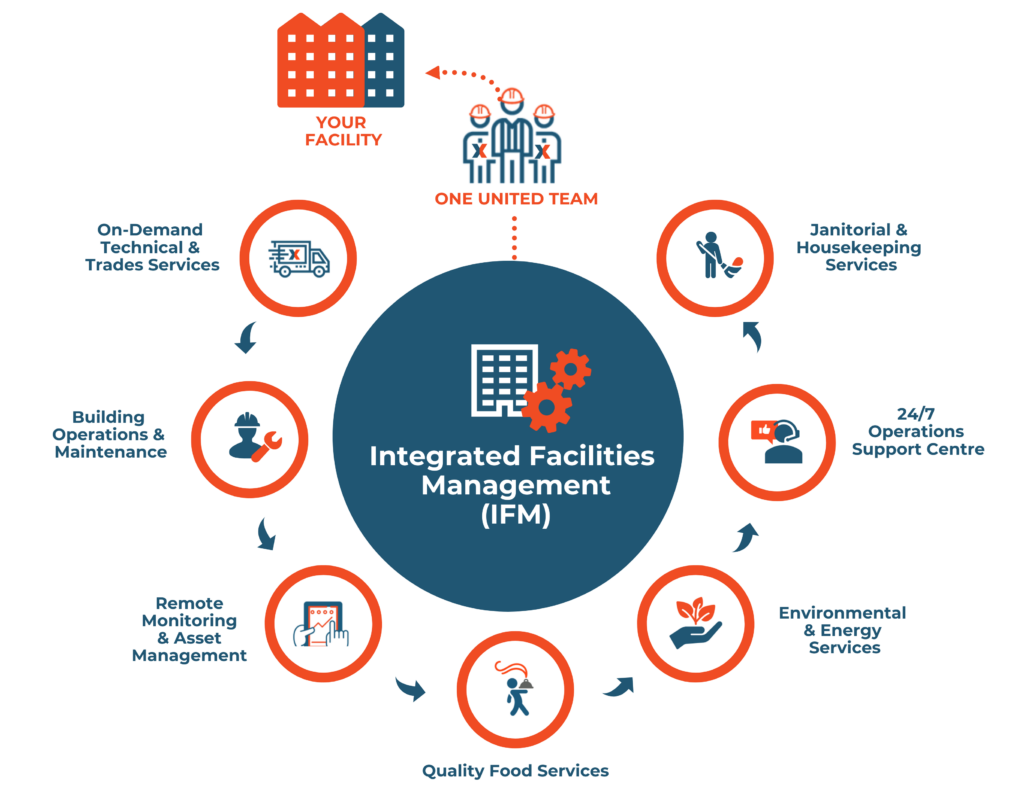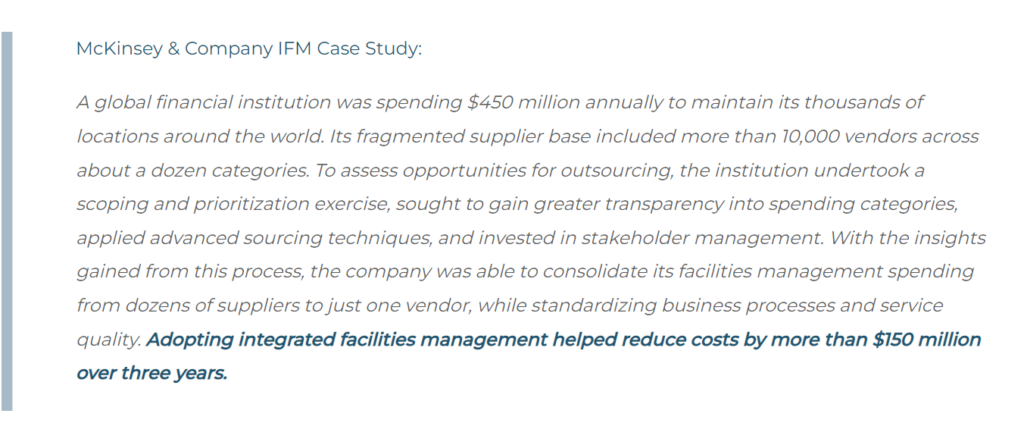
What is Integrated Facility Management (IFM)?
Integrated Facility Management (IFM) continues to evolve in 2025, offering organizations smarter, more sustainable ways to manage complex facilities. Whether you’re in real estate, healthcare, government, or industrial sectors, IFM is the key to align facilities operations with long-term business strategy and environmental goals.
While Facilities Management, or “FM”, is widely understood, the term “IFM” often needs clarification. In this guide, we explain what Integrated Facility Management is, how it differs from traditional models, and why it matters more than ever in today’s facilities landscape.
Facility Management (FM): is the individual tools and services that support the functionality, safety, and sustainability of buildings, grounds, infrastructure, and real estate.
Typically, FM services are broken down by hard and soft services:

Hard FM Services
These services pertain directly to the building itself. They’re inseparable from the building and are typically considered capital expenditures.

Soft FM Services
Unlike hard services, which are built into the property, soft services augment it. These services primarily improve the wellbeing of the people within the facilities and allow them to make the most of their time in them.
When you introduce integrated facility management services it’s a smart way of consolidating hard and soft services or combining them under one service level agreement (SLA). It can also help you achieve and maintain sustainable and innovative facilities, like healthy buildings and smart buildings.
Integrated Facility Management brings all hard and soft FM services under a single contract and delivery model, managed by one dedicated partner. Rather than working with multiple contractors, organizations rely on one provider to coordinate all services — often with a high degree of self-delivery and shared digital infrastructure. IFM is designed to:
- Streamline operations
- Reduce vendor complexity
- Enable cost control
- Align service delivery with broader ESG and strategic goals
For example, an IFM partner might handle both HVAC and janitorial services under one service-level agreement (SLA), using a shared help desk, data platform and performance metrics.
Why Take an Integrated Facility Approach?
The International Facility Management Association (IFMA) has found that some of the key challenges that facility managers face include:
- Workforce Shortages and Training Needs:
There’s a growing gap in skilled facility staff. Hiring is tough, and those already employed need regular training to keep up with evolving demands. - Limited Access to Specialists and Suppliers:
Finding reliable contractors or sourcing critical materials and parts is increasingly difficult, leading to project delays and higher costs. - Complex Operations Across Sites:
Managing multiple facilities—each with unique needs—can be overwhelming. Fully integrating technology to help streamline things remains a hurdle. - Disorganized data:
A lack of centralized, accessible information makes it hard to make timely, informed decisions about facility assets and maintenance. - Regulatory Compliance and Risk:
Keeping up with changing laws and regulations is a constant task. Failing to stay compliant can lead to fines, legal trouble, or safety issues.
These challenges underscore the increasing demand for IFM. As buildings become more complex and expectations rise, facility managers must move beyond siloed operations.
Integrated facilities management brings together people, processes, data, and technology under one coordinated system. As a result, it drives improved efficiency, supports sustainability goals, strengthens compliance, and aligns facility operations with overall business objectives. By using a centralized strategy, organizations can, in turn, reduce costs, improve service quality, and ensure better outcomes for building occupants.
Why IFM?
Would you use several different systems to complete an individual task? No, and it shouldn’t be any different for your facility.
Some sources have found that the most efficient organizations are now consolidating all FM services under a single provider, ensuring high self-delivery rates. This helps maximize value, consistency, and accountability.
By outsourcing to one partner that self-performs most services, clients gain:
- Enhanced cost predictability
- Streamlined reporting and compliance
- Improved building performance
- A better workplace experience for occupants
Who Needs IFM?
Organizations that choose IFM typically want to:
- Improve the workplace environment
- Reduce the number of vendors and simplify contracts
- Monitor performance across all buildings and assets
- Advance sustainability targets and certifications (e.g., LEED, BOMA BEST®)
- Ensure compliance with Canadian codes and standards
- Optimize total cost of ownership
Facility Management Outsourcing Service Models
Be sure it’s really IFM! IFM is not to be confused with other aggregated concepts that could masquerade as an integrated service model but really aren’t.
IFM vs. FM – What’s the Difference?
What are some other facility management service models? Here’s a breakdown:

Single Service
Each FM service is outsourced to a separate provider

Bundled Services
These services pertain directly to the building itself. They’re inseparable from the building and are typically considered capital expenditures

Real Estate Aggregate Model (REAM)
This model typically has a management company as the client point of contact and then they outsource individual FM services to various contractors
IFM differs from these other models because the integrated approach focuses on the tactical and strategic level, using integration and real data to drive more efficient operations. The service delivery teams are cohesive and integrated.
North American Facilities Management Market Outlook (in USD Billions)

Core Components of IFM in 2025
Today’s IFM providers offer robust, end-to-end service portfolios. A comprehensive IFM solution includes:
- Technical and Trades Services
- Building Operations and Maintenance
- Remote Monitoring and Asset Management
- Food Services
- Janitorial and Housekeeping Services
- Operations Support Centre/Help Desk
- Environmental and Energy Services
Read more here.

Benefits of IFM: 2025 Perspective
When organizations choose IFM, they gain:
- Fewer contracts and vendors
- A unified, accountable service team
- Greater visibility across all FM functions
- More time to focus on core strategic goals
- Continuous improvements and cost savings
- Improved sustainability tracking and reporting
Partnering with an IFM provider can also help organizations meet their net-zero, sustainability, and carbon reporting targets, which are increasingly tied to public and investor expectations.
10 IFM Best Practices
Whether you’re a new facility manager or a seasoned professional, IFM is a field that requires continuous education. To stay competitive, it’s best to be on top of the latest integrated facility management best practices and technology. Below are some of our tips to ensure you’re implementing best practices in IFM:

Adopt Predictive Analytics and Internet of Things

Manage Your Team Structure

Make Decisions Using Real-Time Data

Ensure Analytics are C-Suite Focused

Emphasize Technological Investments

Use the Power of Analytics

Make Mobile Accessible

Negotiate Your Service Provider’s Rates

Create an Inventory of Assets

Impose Vendor Check-In/Out
With an ever-evolving society and the digitization of many processes in the field of business, facility managers will find that the incorporation of new technologies, as well as leveraging data, will serve them well in the long-run.
The Pros of Outsourcing Facility Management (FM)
Partnering with an experienced, collaborative integrated facility management service provider can improve productivity and more importantly reduce costs. According to McKinsey & Company, using an IFM partner can reduce FM costs by up to 15%. Let’s break down the pros of outsourcing your FM services.
PROS:

Broader Expertise
Because outsourced facility management companies are specialty service providers, you’ll avoid the hassle of recruiting and hiring an internal employee or team with the right skill sets. FM providers tackle the job from day one. Your biggest task is educating the vendor on your company culture, employee needs, and physical building quirks.

Flexibility
An outsourced FM vendor puts attention where you need it most, while also managing general facility needs. They have the resources to handle facility expansions and improvements at the same as keeping systems running and making needed fixes. Outsource vendors can scale much faster and easier than a single facilities manager.

Cost Savings
One of the biggest positives about outsourcing—and an overall critical focus—is cost savings. Generally, the fees you’ll end up paying to an outsourced facilities management company are less than the salary of an in-house employee. The long-term benefits are clear when coupled with savings on training, ongoing education, employee benefits, and other overhead.
Read more about the advantages of outsourcing facility management.
Is IFM Right For You?
How can you determine what the best solution is for you? Here are some criteria questions to consider when you’re ready to choose the right solution for your needs:
Is IFM right for you? The answer is yes if you:
- Have many employees in multiple locations
- Desire a holistic approach to FM services
- Are looking to reduce total cost of ownership over the lifecycle of your assets
- Prefer a simplified agreement with one supplier
- Wish to optimize the workplace with innovative FM solutions
- Have performance, KPIs and development targets you want to reach
Typically, IFM solutions are procured through a Request for Proposals (RFP) process. It is essential to be prepared and document information on the current state of your facility, any planned changes, and any anticipated facility needs. This will ensure that you are aligned with the IFM solution that will best fit your needs and bring you the most value over the long term.
Whether you’re evaluating a current FM relationship or exploring new integrated facility management companies, finding the right partner is key. Partnering with an IFM provider is a significant step towards bringing your larger organization goals and your FM program into alignment. Your service provider should have a thorough understanding of your core business and how to add strategic value to your organization.

Integrated Facility Services – Where Do You Start?
IFM can revolutionize your facilities management efforts by saving you time, money, and other precious resources. But moving to integrated facilities management isn’t like flipping a switch – it will take time.
Here are a few steps you can take to get started:

Do Your Homework
Perform a thorough analysis of how existing office-based solutions are used within your organization. Look for inefficiencies, overlap, and opportunities to improve your employee experience.

Identify and Align Your Goals
Take time to determine your goals, how they align with broader organizational objectives, and how you’ll measure your performance.

Communicate Consistently
Successfully transitioning to IFM is an exercise in project management. Use feedback surveys, host small group discussions, leverage internal advocates, and ensure people feel they can come to you with any questions or concerns.

Consider Outsourcing Integrated Facilities Management Services
Outsourcing can improve efficiency, reduce costs and give you access to more innovative technologies and processes. Do your research and look for a provider that can be a strategic facility partner to you.
Moving to an integrated facility management approach can mean significant changes to your facility operations. Planning ahead for the learning curve helps prevent issues that could slow your progress.
Associations and Resources:
Several professional organizations govern the FM industry and offer excellent resources to learn about the field and stay updated. These include the following:
- International Facility Management Association (IFMA)
- Global Facility Management Association (Global FM)
- Building Owners and Managers Association (BOMA)
- Institute of Workplace and Facilities Management (IWFM)
Are you ready to benefit from an integrated facility approach? Let’s chat!
